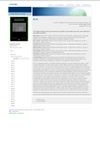148 citations,
October 2008 in “The journal of investigative dermatology/Journal of investigative dermatology” Mice without the vitamin D receptor are more prone to UV-induced skin tumors.
 108 citations,
July 2004 in “American Journal of Pathology”
108 citations,
July 2004 in “American Journal of Pathology” Stress increases a factor in mice that leads to hair loss, and blocking this factor may prevent it.
[object Object]  97 citations,
September 2006 in “Pharmaceutical Research”
97 citations,
September 2006 in “Pharmaceutical Research” No treatment fully prevents hair loss from chemotherapy yet.
 35 citations,
January 2017 in “Journal of Dermatological Science”
35 citations,
January 2017 in “Journal of Dermatological Science” Stress can cause early aging in certain skin cells, leading to problems with hair growth.
 19 citations,
February 2017 in “Journal of radiation research”
19 citations,
February 2017 in “Journal of radiation research” High-dose radiation speeds up aging in skin stem cells.
 19 citations,
July 2015 in “Journal of Ginseng Research”
19 citations,
July 2015 in “Journal of Ginseng Research” Korean Red Ginseng may protect against hair loss caused by chemotherapy.
 17 citations,
January 2019 in “Journal of cancer”
17 citations,
January 2019 in “Journal of cancer” The formula YH0618 can reduce the harmful side effects of the chemotherapy drug Doxorubicin and protect healthy cells.
16 citations,
February 2019 in “Journal of Cellular and Molecular Medicine” Researchers created a rat model to study skin damage caused by radiation, which could help develop new treatments.
13 citations,
April 2010 in “Journal of dermatological science” Chemotherapy-induced hair loss is partly due to decreased laminin-511 and increased laminin-332.
 10 citations,
January 2019 in “Biomarker Insights”
10 citations,
January 2019 in “Biomarker Insights” Scalp cooling to prevent hair loss from chemotherapy works for some but not all, and studying hair damage markers could improve prevention and treatment.
 April 2023 in “The journal of investigative dermatology/Journal of investigative dermatology”
April 2023 in “The journal of investigative dermatology/Journal of investigative dermatology” Low-intensity ultrasound may protect hair follicles from damage caused by a common chemotherapy drug.
 July 2021 in “Open access journal of biomedical science”
July 2021 in “Open access journal of biomedical science” A lotion with natural extracts significantly sped up hair growth in women with hair loss from chemotherapy.
41 citations,
July 2016 in “Radiation Research” Radiation damages salivary glands by harming blood vessels, but antioxidants might help protect them.
 18 citations,
July 2014 in “Molecular Medicine Reports”
18 citations,
July 2014 in “Molecular Medicine Reports” UVB radiation changes the levels of certain microRNAs in skin cells, which may affect cell survival and hair growth.
 14 citations,
July 2011 in “Experimental Dermatology”
14 citations,
July 2011 in “Experimental Dermatology” Applying EGCG on the skin can prevent hair loss caused by testosterone in mice.
27 citations,
May 2016 in “Integrative Cancer Therapies” Chrysin makes docetaxel more effective and reduces its side effects in lung cancer treatment.
 16 citations,
November 2009 in “Experimental dermatology”
16 citations,
November 2009 in “Experimental dermatology” Ionizing radiation damages human hair follicles by stopping cell growth, causing cell death, disrupting color, and increasing stress and damage markers.
 January 2024 in “Annals of Dermatology”
January 2024 in “Annals of Dermatology” Korean Red Ginseng may help protect hair from damage and promote growth.
[object Object] January 2023 in “Iranian Journal of Pharmaceutical Research” Stauntonia hexaphylla extract can help treat hair loss by blocking certain hormones.
 106 citations,
June 2005 in “Journal of Investigative Dermatology”
106 citations,
June 2005 in “Journal of Investigative Dermatology” The document concludes that assessing hair follicle damage due to cyclophosphamide in mice involves analyzing structural changes and suggests a scoring system for standardized evaluation.
 58 citations,
October 2016 in “Journal of Investigative Dermatology”
58 citations,
October 2016 in “Journal of Investigative Dermatology” Activating Nrf2 protects human hair follicles from oxidative stress and helps prevent hair growth inhibition.
3 citations,
July 2023 in “International journal of molecular sciences” Stress may contribute to hair loss in alopecia areata by affecting immune responses and cell death in hair follicles.
 May 2023 in “Journal of Ethnopharmacology”
May 2023 in “Journal of Ethnopharmacology” The wild garlic plant, Allium macrostemon Bunge, can promote hair growth and could potentially be used to treat hair loss.
 150 citations,
October 2010 in “The American Journal of Pathology”
150 citations,
October 2010 in “The American Journal of Pathology” The document concludes that more research is needed to better understand and treat primary cicatricial alopecias, and suggests a possible reclassification based on molecular pathways.
 32 citations,
January 2022 in “International Journal of Molecular Sciences”
32 citations,
January 2022 in “International Journal of Molecular Sciences” Melatonin, a hormone, can help protect skin from aging by reducing stress, inflammation, and damage, and may also help treat hair loss in women.
 31 citations,
January 2011 in “Dermato-endocrinology”
31 citations,
January 2011 in “Dermato-endocrinology” Melatonin protects skin against UV damage by regulating various cellular processes.
 31 citations,
April 2007 in “Experimental Dermatology”
31 citations,
April 2007 in “Experimental Dermatology” Stress in mice delays hair growth and treatments blocking substance P can partly reverse this effect.
 27 citations,
June 2015 in “Journal of photochemistry and photobiology. B, Biology”
27 citations,
June 2015 in “Journal of photochemistry and photobiology. B, Biology” The new lab-grown skin model is good for testing sunscreen's protection against DNA damage from UV light.
 3 citations,
June 2011 in “Korean Journal of Clinical Oncology”
3 citations,
June 2011 in “Korean Journal of Clinical Oncology” The document concluded that there were no effective ways to prevent hair loss from chemotherapy but treatments were being explored.
 January 2024 in “Archives of Biological Sciences (Beograd)”
January 2024 in “Archives of Biological Sciences (Beograd)” AP collagen peptides may help hair grow better and become stronger.






















